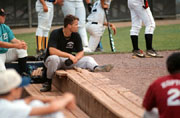by: Bob Howdeshell
High School Baseball Web
No player wants to sit on the bench, no parent wants to go watch
their son straighten bats and helmets. Sometimes there are reasons
that your player may not be in the game that make perfect sense to
the coach and are the best for the team.

Parents would love to see their kids playing in every game. But
in some sports programs, kids who aren't top performers will find
themselves watching from the sideline more than they-and their
parents-would like.
Here are some helpful steps you can take to make your child's
time on the bench more fun for both of you.
Investigate the league or team
Before signing your child up for a sports team, learn about
the local youth sports leagues in your area. Make sure that the
philosophy of the sponsoring organization coincides with your goals
and your child's. Ask:
- Will he be playing on a team in which participation is a
priority? (If so, every kid should get into every game at some
point.)
- Will he be playing on a "winning-is-everything" team?
(If so, the less-skilled players will spend a lot of time on the bench.)
Visit games
Visit games to see if the kids that are already participating are
having fun and if your child would fit in well. Observe the coach's
behavior and interaction with the kids. Check out the atmosphere
among the parents; is it calm and friendly or hostile and competitive?
If your town has several levels of competition in a given sport,
encourage your child to play in the program that matches his skill
level and attitude. Forcing him to stretch to play on a more
accomplished team could land him on the bench.
Its the coach's call
Parents need to be realistic about their child's athletic ability.
What looks like benching to you may not be benching to a coach.
"My job as a coach is to put players into situations where they can
be successful," says one Pee Wee A-level hockey coach. "The player
with the skills might not like the pressure of being in a big game.
If a coach uses one player for one kind of play and another for
something else, that may not be benching-that's coaching."
Talk to the coach
Your child might find it embarrassing, or even intimidating, to talk
to his coach about being benched. Still, you should encourage your
child to talk to the coach about the issue in a positive way. He
might start with a question such as, "Coach, how can I improve my
game?"
This approach opens the door for the coach to talk honestly with
your child. It also tells the coach that this kid is serious and
wants to improve.
If your child's attempt to talk to his coach is unsuccessful, or
he's still sitting out more than other kids and is distressed about
the situation, it might be time for you to speak to the coach.
Help build skills
You can help, too. Enroll your young athlete in a skill-building
camp. Practice with him in the backyard. Help him, get to practice
on time, or to the field, to work on his own whenever he wants to.
But if your child becomes reluctant to go to practices and games,
he and team sports may not be a good fit. Consider steering him
toward an individual sport, such as tennis, swimming, biking, or
golf, or even an activity other than sports.
Who's upset, you or your kid?
Seeing your child "riding the pine" may resurrect all your
(or your spouse's) old memories of not being picked for sandlot
baseball. Parents should also realize that their kid might be
having fun just being with friends on a team and enjoying the
dynamics of playing in a group.
Support your child
- Stress enjoyment over outcome
Regardless of the league, every kid will probably spend some time
on the bench. It's important that you say and do the right things
so that your child still enjoys the experience of being on a team.
Ask questions which focus on the enjoyment of the sport, not on the
outcome of the game. Instead of asking, Did you win? ask: Did you
have fun? Did you learn something today?
Make sure to attend the games when your young star is benched,
as well as the ones he plays in. This lets him know that he's
an important part of the team even when he doesn't play.
Parents should also praise their child, even if he didn't get
to play much. Just be careful not to make hollow compliments.
Some encouraging words might include:
- "You looked like you were really keeping everyone's spirits
up on the bench, Kiddo."
- "I'm really proud of how you stayed focused."
- "You did a really good job of guarding your man [rebounding,
whatever] when you were in the game."
Simple words of encouragement can help your child realize that
there are more ways to contribute to a team's success than being
on the field or court. Not everyone is an accomplished athlete.
Sports can be enjoyed by players who have average ability, too,
especially if they have great heart.
Reprinted from Sports Parents Online magazine